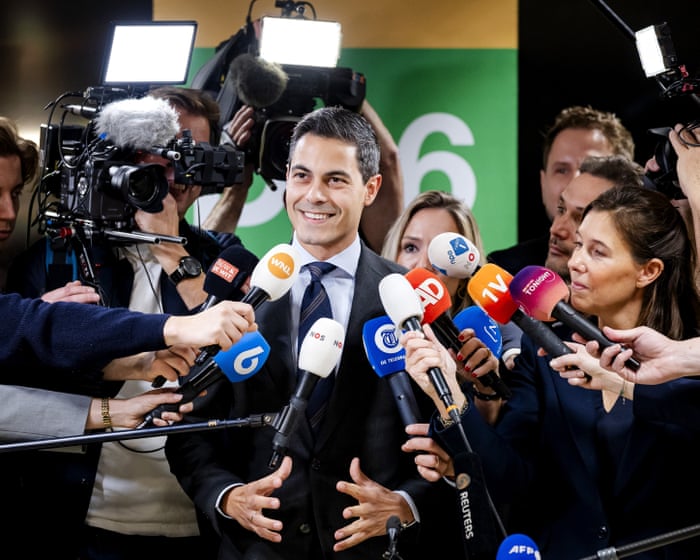Progressives often view patriotism with suspicion, leaving flags and anthems to the populist right. However, the centrist D66 party in the Netherlands, which nearly tripled its seats in this week’s election and is poised to form the next government, has demonstrated a different path is possible.
Under Rob Jetten’s leadership, the party embraced what could be called progressive patriotism—and voters responded positively. Their success was built on five key strategies that politicians across Europe could learn from.
1. Adopt a positive mindset
For years, the Dutch left often came across as discouraging, focusing on what couldn’t be done. Jetten changed this narrative. Instead of preaching doom and restrictions, he emphasized the country’s potential for improvement and urged action. His borrowed slogan, “het kan wél” (a somewhat awkward Dutch version of “yes, we can”), conveyed optimism. This approach aligned with the “Yes in my back yard” philosophy, suggesting that excessive risk aversion can hinder meaningful progress.
2. Celebrate patriotism with pride
National pride had long been dominated by the right, with progressive circles wary of echoing exclusionary rhetoric. D66 broke from this pattern by showing that one can take pride in the Netherlands—consistently ranked among the world’s happiest countries—without marginalizing minorities or foreigners. At party events, Jetten stood proudly beneath the Dutch flag, and in debates, he championed a progressive form of patriotism that focused on defending the nation on inclusive terms.
3. Don’t shy away from confrontation
During debates, while other centrist and left-leaning leaders maintained a reserved tone, Jetten actively challenged his opponents. He directly confronted Geert Wilders of the far-right PVV on policy details, from climate change to migration. While some fear that heated debates harm political discourse, Jetten recognized that elections should highlight policy differences—especially in a multi-party system—and focused his criticisms on his main ideological opponent.
4. Advocate clearly for left-wing economic policies
Despite cultural issues driving some voters to the right, polling shows many Dutch voters support left-leaning economic policies. Most across party lines favor taxing capital more and labor less. D66 campaigned accordingly, pushing for progressive inheritance taxes, eliminating regressive mortgage deductions, and better rewards for workers. They even proposed a tax on millionaires—and this approach proved effective.Voters aren’t afraid of these policies—they actually want them. There’s no need for anti-capitalist rhetoric or discussions about degrowth; straightforward, traditional social democratic ideas are enough. Liberals are mistaken if they believe voters are wary of such approaches.
Build a broad coalition
Progressives who largely agree on most issues often focus too much on their differences. Jetten broke this pattern by finding common ground on key topics, including immigration, and forming a wide, though not perfect, voter base.
According to Ipsos I&O data, 20% of D66 voters in this election came from the center-left GreenLeft/Labour alliance (GL/PvdA), 13% from the center-right NSC, 11% from the right-wing VVD, 9% were previous non-voters, and even 7% had supported the far-right PVV.
Since 2012, the progressive bloc has been steadily shrinking. Jetten succeeded in appealing to right-wing voters and creating a big tent.
Skeptics may argue that any coalition led by Jetten will be less progressive than his platform suggests, but that misses the key insight.
Jetten understood that hope is appealing. While the VVD, once a liberal party but now more conservative, became increasingly pessimistic and adopted themes from the PVV, Jetten offered a brighter outlook. In a country tired of cynicism and unimpressed by the left’s negativity, he demonstrated that optimism isn’t naive, confidence isn’t solely conservative, and hope—when well-reasoned and steadfast—is not a weakness but a strength.
Simon van Teutem is a writer for De Correspondent.
Frequently Asked Questions
Of course Here is a list of FAQs about the topic Dutch voters have embraced optimism a lesson for liberals everywhere inspired by Simon van Teutems perspective
General Beginner Questions
1 What is the main point of this Dutch optimism idea
The main point is that Dutch voters recently shifted away from fearbased antiimmigration politics and instead supported parties offering a hopeful optimistic vision for the future Commentators like Simon van Teutem argue this is a powerful lesson for liberal and progressive parties everywhere
2 Who is Simon van Teutem
Simon van Teutem is a political commentator and strategist who has analyzed this shift in the Dutch political landscape He is pointing to this event as a case study for successful liberal politics
3 What exactly happened in the Netherlands
In a recent parliamentary election a coalition of green and socialdemocratic parties led by Frans Timmermans performed much better than expected They won by campaigning on hope climate action and social justice defeating a farright party that focused on antiimmigration sentiment
4 What does a lesson for liberals everywhere mean
It means that instead of just criticizing their opponents or campaigning on fear liberal parties can win by presenting a positive compelling vision of the future that gives people hope and something to vote for
Deeper Analysis Benefits
5 Why is optimism a good strategy in politics
Optimism is motivating and unifying It can inspire people who feel apathetic or cynical to participate A hopeful vision for the futurelike a green economy or a fairer societycan be more powerful than a message based on what youre against
6 What are the benefits of this approach for voters
It gives voters a sense of agency and possibility Instead of feeling like they are just choosing the lesser evil they feel they are voting for a tangible positive change that will improve their lives and their childrens futures
7 Isnt this just ignoring real problems
No its about framing the solutions to those problems positively For example instead of framing climate action as a series of sacrifices it can be framed as an opportunity to build a cleaner more innovative economy with new jobs and energy independence
Common Challenges Problems



